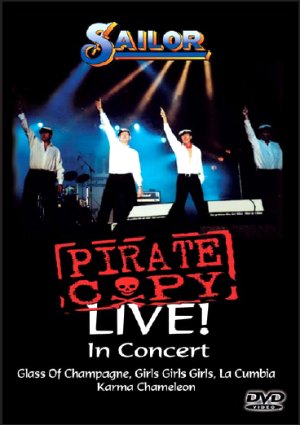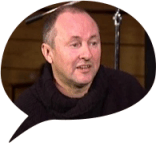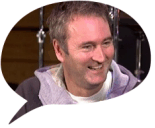|
Scrapbook
|
|
Scrapbook
|
DVD
"Pirate Copy - SAILOR Live In Concert"
Reviews
& Interviews
Click here for
further information about the DVD!!
 This is what Angel Air writes about
SAILOR and the DVD:
This is what Angel Air writes about
SAILOR and the DVD:
SAILOR was signed to Epic records (part of CBS) during 1974 and
they quickly experienced chart success in Holland with
"Traffic Jam". In the UK "Glass Of Champagne"
made no 2 in the charts during 1975 with "Girls, Girls,
Girls" making Top 10 in the UK during 1976 and further
single chart success during 1977 with "One Drink Too
Many".
Singles success was a very
small part of what SAILOR were about as they also had hit albums
such as "Trouble" coupled with their live reputation
but by 1980's release of the album "Dressed For
Drowning" the band called it a day. PHIL PICKETT then joined
CULTURE CLUB and co writing one of the biggest and most popular
hit's of the 80's "Kama Chameleon". The SAILOR story
did not bite the dust there as in 1989 BMG Records in Germany
approached the band to record some new tracks which became
sizeable hits all over Europe: "The Secretary",
"La Cumbia". A new album "Street Lamp" was
also recorded.
In 1993 the band reformed for touring and at the huge Waldbuhne
Stadium in Berlin they played to over 25,000 fans. This was
quickly followed in 1994 with a "Greatest Hits" release
from Epic Records.
Now in the 21st Century and
their 4th illustrious decade, SAILOR still surprise, entertain
and enthral audiences with their incomparable style of powerful
music and theatrical entertainment recorded at The Swan Theatre,
High Wycombe, UK during November 2002 to a sell out audience.
DVD Interview Grant Serpell
Question: What do you feel that SAILOR can give an audience today?
Grant:
Well, exactly the same as they could give 28 years ago. SAILOR
when it first started was old-fashioned. The music was based upon
a musical that Georg was writing, it was very reflective, very
dark, very atmospheric. We tried to produce this sort of
nostalgic music, and so the sound of the Nickelodeon, which I'm
sure the other members of the band will tell you about, had a
very nostalgic feeling . There was nothing groovy about SAILOR whatsoever.
I always loved the romanticism, because when SAILOR first started
there really was no romanticism in pop music. It was very
frustrating when we first started doing videos we wanted to have
dark videos and of course we were told 'no, you've got to light
it bright', it was all bright blues. And then when Ultravox came
along with "Vienna" and did these atmospheric videos we
were so frustrated because that's what we wanted, but we weren't
allowed to do it.
. There was nothing groovy about SAILOR whatsoever.
I always loved the romanticism, because when SAILOR first started
there really was no romanticism in pop music. It was very
frustrating when we first started doing videos we wanted to have
dark videos and of course we were told 'no, you've got to light
it bright', it was all bright blues. And then when Ultravox came
along with "Vienna" and did these atmospheric videos we
were so frustrated because that's what we wanted, but we weren't
allowed to do it.
Question: What type of audiences do you attract now?
Grant: The majority of gigs we do are in Germany, multi-band gigs in Germany with 60s and 70s bands. Therefore it tends to be an average age range from 25 to 45. But in the open air ones you get a lot more youngsters. We've played in Latvia now twice and both times in Latvia we were playing to kids up to 22. It's still a sort of family audience, but this summer we played in Latvia to 8.000 and at least half of them were youngsters. And they loved it.
Question: There has always been a strong creative inspiration within the group. Did you start out deliberately wanting to be different?
Grant: Absolutely. In fact I have to take a certain responsibility for that. I felt by being different we had a greater chance of being successful. Before SAILOR I worked in a band called Affinity and I also played with Mike D'Abo and with Geno Washington and so I've seen what made them different and successful. It's very difficult in the music business and A&R man from the record company would come along and say 'sorry, I can't get you a deal, it's not original enough' and then in the next breath he would say 'sorry, I can't get you a deal, it doesn't fit into the mainstream of what we're doing at the moment'. And so I tried to make us different from other bands. We weren't successful in the UK to start with. Our first album really didn't do very much, but fortunately "Traffic Jam", our first single, was a massive hit in Holland and then the album was massive, it went Gold in Holland very very quickly. On the basis of that they couldn't really drop us. But it was touch and go whether we would make the second album, but fortunately the hits came on the second album.
Question: Mandolins and glockenspiels are not normal instruments on hit records. How difficult was it to incorporate them into the recordings?
Grant: Well, not into the original recordings because they were all played separately. The problem was actually getting them into live performance. That's when the Nickelodeon was developed. So the actual Nickelodeon sound was produced by a combination of a very cheap glockenspiel, tack piano and mandolin, but played separately.
Question: "A Glass Of Champagne" was the highest selling SAILOR single. I think it's the perfect well-crafted three-minute pop song. Do you think it gets the recognition it deserves?
Grant: It's quite interesting, actually, because if you ask people who have heard of SAILOR, what records we made, they will always remember "Girls Girls Girls". But as a name of a record they will not remember "A Glass Of Champagne" because I think "A Glass Of Champagne" is quite an unlikely name for a single. But when you play them the single they say 'oh yes, I remember that, it was a great record'. And so I think people actually don't connect the name "A Glass Of Champagne" with the record. It's worth stating, and I'm sure Georg who wrote it won't mind saying, that it was inspired by Virginia Plain. Georg was so knocked out with Virginia Plain that "A Glass Of Champagne" was a tribute to it.
Question: Do you think that song could have been written today?
Grant: Yes I think so, because in terms of today's music I think that the arrangement probably wouldn't come about, but the structure of the song would come about. It's a very chordy song, but as you say very very simple. And in fact not even a three-minute pop song, I think it's 2.48 or something. In fact the whole of "Trouble", our second album, was less than a half an hour.
Question: What do you remember about the recording of "A Glass Of Champagne"?
Grant: I remember Georg coming in with the backing track on a very small tape recorder, and he said 'I got this backing track' and he started playing it and I said 'Georg, that's a hit record!' We hadn't even heard the song, it was just the backing track which to me sounded like a hit record. The thing is we needed it because the rest of the album had been made, but "Girls Girls Girls", although it has a lot of quality, does not scream hit single actually. It is a standard, especially in Europe, it really is, and in fact in the UK, because "I'm A Celebrity, Get Me Out Of Here" played the whole of it on one of the episodes on a Friday night. But we needed a hit single and when this came in we knew this was the one we were looking for.
Question: Can you actually tell in the studio when your are recording if something is really special, it's really something to happen?
Grant: No, I don't think so. I have no idea. The thing is for me pop music is all about songs, and therefore when you're recording a song in the studio you've heard the song so many times that you must have lost that initial thrill of the song. But equally I have to say that in the studio something magical can happen in terms of arrangement or a producer's idea or even just something that works in the spirit of the moment that could be the difference between a hit and not a hit.
Question: Do you think it's a bonus or a slight confusion that your image falls between the two stools of theatre and rock?
Grant: I think one of the difficulties is the name SAILOR. When we formed we wanted to be a theatrical band, that was absolutely the intention. In the same we say that Genesis was theatrical in that era. But what happened, as soon as we got our record deal the vinyl crisis came along. No one now remembers, but basically what happened was that people said 'there's not enough vinyl left to make records, the record business is going to die', and so, instead of being and album market the record market changed over night to a singles market. We, being a conceptual band, suddenly had to find the single, and this was the problem with the first album. "Traffic Jam" was totally different from the rest of the SAILOR concept, and in fact we didn't necessarily want "Traffic Jam" to be on the first album. But thank goodness it was, otherwise probably the first album wouldn't have sold in Holland.
Question: Do you embrace new music technology at all now?
Grant: Yes, I think we have to. I mean, the Nickelodeon always did embrace music technology. SAILOR never had a bass guitar, the bass has always been a synthesizer, so the original bass sound was an ARP 20600 and on stage the bass sound was produced by an ARP synthesizer and a tack piano and we also had... I'm sure somebody else will tell you about it, a glockenspiel that was operated by the keyboard, using little magnets. But unfortunately it was always about sort of 300 milliseconds behind what we were trying to play and therefore didn't really work very well.
Question: What do you think the successful elements of your singles were that made them really so popular?
Grant: Well, in the UK certainly "A Glass Of Champagne" was just immediately commercial. And "Girls Girls Girls" was just a very interesting, very original song, lyrically very clever, lyrically maybe a bit chauvinistic for today's market, so I don't think "Girls Girls Girls" would be likely to be written these days. But certainly Georg was on a rich fame of writing and I think having three people to work with inspired him and made him write better songs. Plus the fact that, and this will always maintain, that we were on the road performing. I think it's very difficult for writers to sit at home, either in absolute poverty or in absolute luxury, and be inspired and produce wonderful original material. I think being out on the road, listening to the radio, you drive along, you get snatches of other records that you hear in a slightly different way, that can send the creative brain away.
Question: Which of your records are you particularly proud of?
Grant: One of my favourites is "Jacaranda" which I think was the B-side to "A Glass Of Champagne" (a note from MARINERO: no, it was the B-side of "Girls Girls Girls" ;-)), because it's reflective and romantic. But I suppose I have to say that in terms of my well-being it's "A Glass Of Champagne", simply because it was the hit single that made us successful, and without it we wouldn't have been successful and therefore a lot of the other songs would never have been written because they wouldn't have had a chance.
Question: Are there any ambitions left that you want to fulfil?
Grant: Absolutely. I would like us to come up with an absolute brilliant, amazing single that the modern A&R world couldn't say 'no' to and couldn't say 'oh no, you are too old', but 'yes, we've got to go with that because it's so interesting' and then it gets played and then we could start again in the UK. I'd love to play again in the UK, but to a genuine interested market.
DVD Interview Phil Pickett
Phil:
I think that we wanted to do something a bit brave, and it was
always a bit like 'oh god, short hair, white sailor suits, come
on guys - what's going on?', but we made ourselves do it, and we
got a fantastic reaction from people because everybody else at
that time was wearing denim and had long hair and electric
guitars and we just wanted to do something that had a sound of its own. We were creating a
sound and a whole world of these harbour towns and sailors'
nights on the town and things like that. It was quite difficult
sometimes because all your mates are going 'what are you doing?',
but I think a lot of people had respect for us because we were
unique.
that had a sound of its own. We were creating a
sound and a whole world of these harbour towns and sailors'
nights on the town and things like that. It was quite difficult
sometimes because all your mates are going 'what are you doing?',
but I think a lot of people had respect for us because we were
unique.
Question: Mandolins and glockenspiels are not normal instruments on hit records. How difficult was it to incorporate them into the recordings?
Phil: No, we just decided it on the template of the sound that we wanted to have as the original band with Georg, Henry, Grant and myself, and we made the whole thing work with four people. That was very important. The vocals and everything had to be performed. We were quite purist about that. We needed to do everything on stage like the way it was on the record. We didn't over-record and do lots of overdubs and thinks like that, we just kept it very simple and kept to that more European tradition of music.
Question: What was the link that brought all the original members of the group together?
Phil: Well, I guess it's true to say that originally I met Georg when I was working at a music publisher's in London and my job - it was my first job in the music business, and last - was to listen to tapes of people when they came in, like an A&R department really, and I heard Georg's music, I never met him, and I was just nuts about his music. My ambition was to form a band and to meet people who I felt I could work with and write with. Georg seemed to have everything. So I got in touch with him and somehow cheeky asked him if he'd mind writing with me as well. So we made an album together called "Kajanus Pickett" and then we decided after that to go separate ways for about six months. We thought it would be great to do it again, but with a band because we suffered from just being a duo. We were trying to be like "Hall and Oats" or something like that. Grant was a friend of Georg's and Henry was a friend of mine, so we got together and decided to form SAILOR.
Question: Do you think it's a bonus or a slight confusion that your image falls between the two stools of theatre and rock?
Phil: Quite possibly, yes. As you know we split up at the end of the 70s when punk came in and record companies just got rid of everybody unless you had a sort of safety pin through your nostril. I think we ran our natural course. And I guess we were then a pop band, but we didn't always consider ourselves as a pop band. When you listen to the first album "Sailor" it's far out, it's still my favourite album that we did. But there again we couldn't continue like that, we had to have the hits, we had to go through that machine, that whole kind of sausage factory. Not that I regret it, but I think now that we revisited the whole thing in the 90s and after the year 2000, we find that we can be more confident about that theatricality and have fun with it. It's not so much an experimental thing now. We really enjoy it.
Question: Does every change in the line-up bring you certain strength?
Phil: Oh definitely, yes. Everybody is expendable in this band because the arrangements and the songs are what it's all about. We're moving on a little bit now, doing some new recordings. But the sound is the thing, and we've play in very tight arrangements, I suppose in a way that bands like The Beach Boys did as well. I went to see Brian Wilson a few weeks ago, and everything was absolutely faithful to the records. That's what you want, that's what I want as a fan going to see. So that's what we do.
Question: What's your view on the present state of the music business?
Phil: It takes me a long time to answer that... I'm always very thrilled by pop music. I've always been involved in reasonable current things as well as enjoying what I do in SAILOR. I think the two help each other. But I think I'm disappointed at the moment a little bit with the trend of the whole industry going into the "pop idol" thing. Not that I resent those guys success, good luck to them, but I feel it cheapens the whole magic of what you're trying to create for the public. Because people see everything, how it's done, and then three weeks after if they fail, public completely loses interest. So, it's a television product, it's not a music product. These things come and go like a pendulum and come back again, and I've heard that record companies are signing bands again now, and not only factory-made pop artists. But however you get there - some of them are really good. Some of the runners-up are probably better than the winners.
Question: Are there any plans to take this band or this line-up into the studio?
Phil: We always threaten doing that. You have to find a worthwhile reason to do it. The promoters who have us on shows now, they want us to do a certain type of show. There's absolutely no point in playing new songs, maybe we play one or two new numbers. It depends. With the success of what we are trying to do now in the UK with this show and other concerts that we are trying to do in Europe, we would hope to do that, and then find a record company that will come in and say 'right, ok, let's do some new recordings'. But it's got to be relevant. When we first started we were very much into the pop thing with the kids and everything like that. I think we just have to find an avenue that will be worthwhile and enjoyable for us to do.
Question: As a songwriter, do you find that creative inspiration is something that has to be learned and perfected, or is it something like a gift?
Phil: I think there has to be a gift there to begin with. You get ideas and you have a desire to want to do that, instead of singing other peoples' songs or lyrics. But then I think it's like anything else, it's a lot of hard work. The motivation has to come first. And it's what I love doing, so I never need much motivation to write, that's the reason I'm into this, why I'm in bands, play with people, play on stage and everything.
Question: In the studio, did you have input into what was recorded and how it was produced?
Phil: We were lucky in that respect. We didn't have people coming down and telling us what we should do and what we shouldn't do. So it was very much our own creativity. We were trusted in the respect. I think maybe that has changed now with producers and things like that. But we kind of produced our own records, so we used to deliver it to the record company. Whether we could do that now I don't know, but we just worked it all out with the four of us.
Question: Which of your records are you particularly proud of?
Phil: Well, as I said, I think "Sailor", obviously the hits "Girls Girls Girls", "A Glass Of Champagne". I think "Sailor" is my favourite record because that was the blueprint of our sound. We've modified and moved on from that, but I think really that was the high spot. And then I think the second album "Trouble" was the hits and the success and everything like that. But I think "Sailor" was the favourit really.
Question: And finally Phil, any ambitions left that you personally want to fulfil within the band?
Phil: I'd like to see us have a hit again. We do other things as well as SAILOR. We produce and write - I say we do, I do it, and Peter does. But we are still doing it. We have ambitions, I have an ambition for SAILOR because it's a band that I formed with my mates. And I always think everything is possible. You never really know, the story is never written. I'm quite positive about that. It is difficult. We might just slot in there again and take off. If it doesn't happen, that's fair enough. We enjoy doing it, and we carry on doing it aynway. We found our little niche and we enjoy it. And if we have the success again, the joy of that would be to play for new and bigger audiences and having a lot more people come and see us.
DVD Interview Peter Lincoln
Peter:
I wasn't involved in the original line-up of the band back in the
70s, but what we do now pays homage to their original concept.
But we also realise that one needs to go and entertain an
audience, really go at them and give them something they not
usually  see, which is why we take our clothes of at the end
of the show...!
see, which is why we take our clothes of at the end
of the show...!
Question: You have toured the world extensively, but Greenland must have been different?
Peter: I still don't really know how that came about. We were doing a lot of work in Denmark and Greenland is a Danish colony. Our promoter in Denmark rang us up and said 'how do you fancy the - you know - old paid holiday in Greenland?' and we went. And it was the most incredible experience. I can't remember all the statistics, but it was one of those trips where every time someone opened their mouth whatever they said was gobsmacking. We arrived there and drove from the airport to hotel in the capital of Greenland, Nuuk, which has a population of 12.000. The whole country is either 14 or 16 times as big as the UK, but only 60.000 people live there. So you can't get your head around that. We go to the hotel, and there was a pedestrian crossing outside my hotel window - it was the only traffic light in Greenland. It was put there to give the cars a chance, because this particular road was the main connection from a main living area to a main shopping area, so there were constantly people crossing this road and the cars would always just sit and give way to the pedestrians, so they put the traffic lights there to stop the pedestrians and let the cars go through. Then I religiously took my swimming trunks with me, like you do when you go away, and I went down to the hotel reception and said 'where's the swimming pool?' And they said 'oh, there's no swimming pools here.' I said 'what do you mean, here?' and they said 'well, nobody learns to swim in Greenland.' I asked 'why is that?' and they said 'if you fall in the water it's going to kill you anyway, so if you can swim it only prolongs the struggle, doesn't it?'. So they don't even learn to swim. And every time someone opened their mouth it was something like that, just a bizarre statistic. The second town we played in had a population of 5.000 people and 10.000 dogs. Of course everybody has a team of huskies because the only way to get from town to town - there aren't any roads, you either have to fly or go on a snow-bike on the land or be pulled by a dog-sleigh. Anyway, I could go on about Greenland all day, it was fantastic, really really fantastic!
Question: Are there any plans to take this line-up into the studio?
Peter: It would be nice, it would be a really positive thing. But it's one of those difficult things, you either have to try and write things deliberately to hark back, and one doesn't want to do that too much, to fit into the SAILOR sound, or take the thing forward. SAILOR did have successes recently in the early 90s in Germany, which was just before I joined the band, and they did have some radio hits in Europe in the 90s. So I mean, there's always scope, there's always a chance. It would be great.
Question: What personal ambitions do you hope to fulfil within the band?
Peter: It would be nice to augment the show, it would be nice to be in a position where we could perhaps do more work in the UK. Some dancing girls might be nice... no! Just do what we do really. It has a slightly mad element to it, and we do come up with a few insane ideas. And they usually get taken on board. It's normally when we are late at night in a hotel bar or sit around after a flight has been delayed or something like that when somebody says 'well, what about that?' and suddenly we're off again.
Question: How easy was it for you personally to fit in within the band?
Peter: Really fine. In previous incarnations of my career I've met the guys on the road in Germany. I was working with Shakin' Stevens and with Cliff Richard before I joined SAILOR. I've met them, and Grant the drummer lives reasonably locally to me anyway, and we have mutual friends. So it wasn't difficult. They are really good guys.
DVD Interview Rob Alderton
Question: Which of your records do you enjoy playing the most on stage?
Rob:
The mad stuff really. Things like "Vera From Veracruz".
"Girls Girls Girls" is a song I loved, in fact that was
my entry into SAILOR really, trying to find that song several
years after it had been deleted. That was how I discovered the
sound of SAILOR. The crazy stuff. I mean, I love "A Glass Of
Chamapgne", but for me things like that are a bit too
uncomplicated. I actually quite like the chalange of some of the
other tunes, when there's complex stuff to do on the Nickelodeon.
Things like "Panama", "Vera From Veracruz".
Stuff where I can get my teeth into.
I mean, I love "A Glass Of
Chamapgne", but for me things like that are a bit too
uncomplicated. I actually quite like the chalange of some of the
other tunes, when there's complex stuff to do on the Nickelodeon.
Things like "Panama", "Vera From Veracruz".
Stuff where I can get my teeth into.
Question: What is it that European audiences like about SAILOR so much?
Rob: It's the European sound. It's intrinsicly not English, with the piano accordion and the Nickelodeon. I've always seen the Nickelodeon as a sort of Dutch street organ. The hurdy-gurdy kind of thing which just belongs on the streets of Paris or Amsterdam. I think European audiences still seem to like melody. In Britain we seem to have gone the American route where there has been the breakdown gradually of melody and harmony, and so you're left with the bare bones very little. But for SAILOR it's very melodic, very harmonic. And the Europeans still frankly like a tune you can whistle. We give them that.
Question: Who is responsilbe for the original design of the Nickelodeon?
Rob: Well, you have to understand of course I'm not an original member, so everything I have is on hearsay or inherited history. Georg, I believe. The concept of one machine producing all the music was Grant, and the whole sort of SAILOR sound. But the actual physical design of it was Georg.